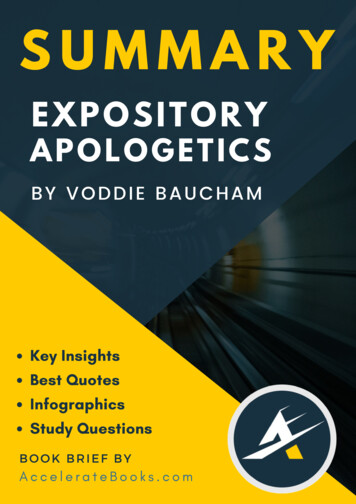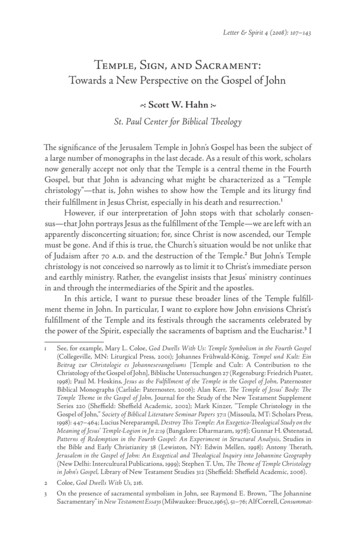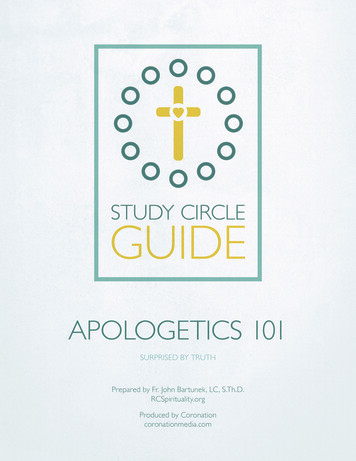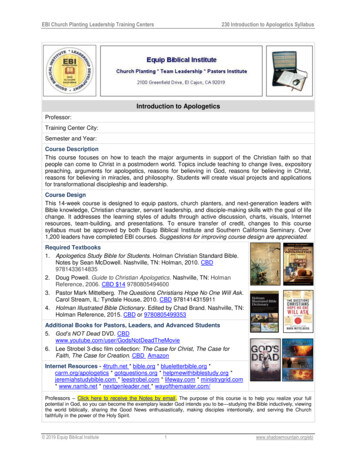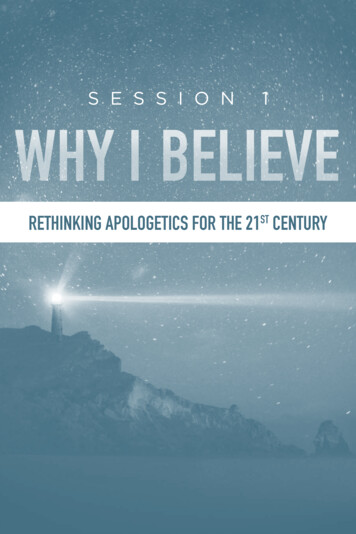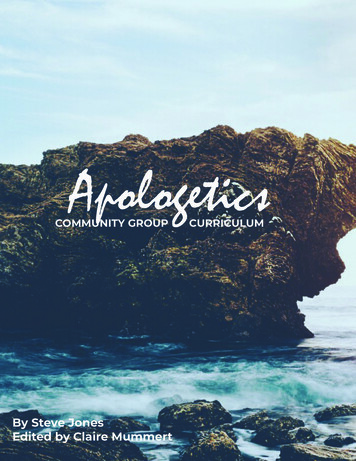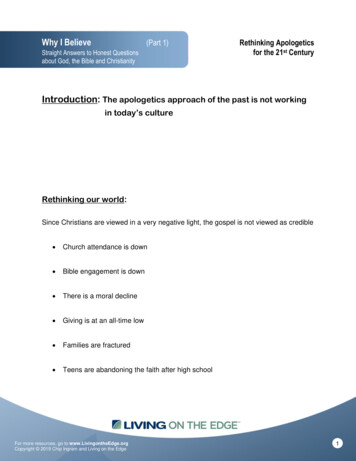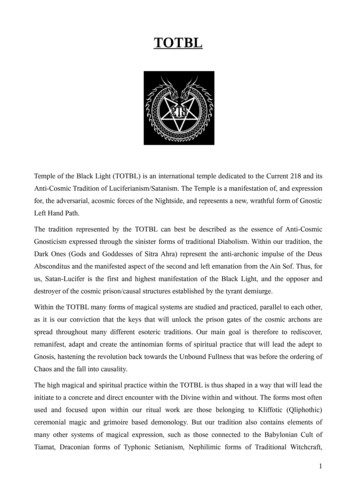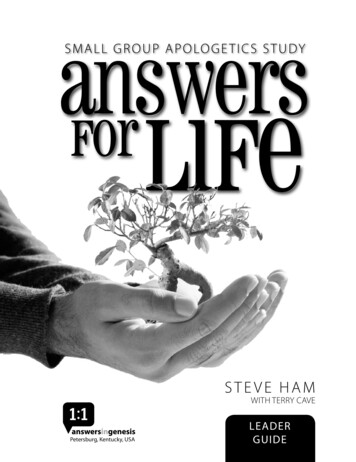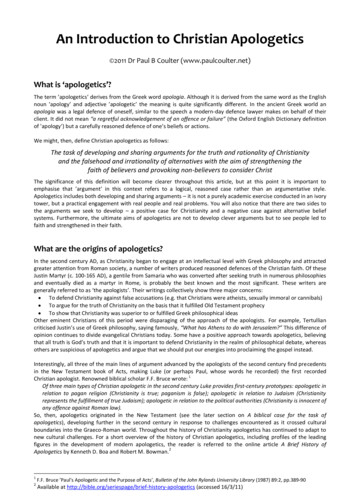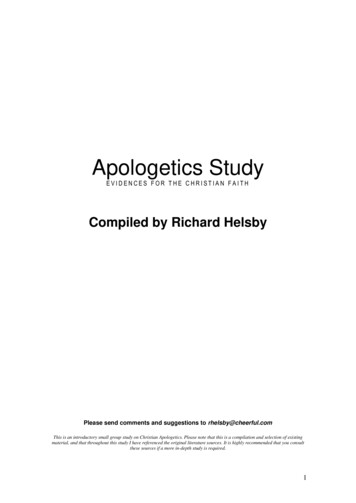
Transcription
Apologetics StudyEVIDENCES FOR THE CHRISTIAN FAITHCompiled by Richard HelsbyPlease send comments and suggestions to rhelsby@cheerful.comThis is an introductory small group study on Christian Apologetics. Please note that this is a compilation and selection of existingmaterial, and that throughout this study I have referenced the original literature sources. It is highly recommended that you consultthese sources if a more in-depth study is required.1
Table of ContentsSTUDY ONE – APOLOGETICS INTRODUCTION . 5WHY APOLOGETICS? . 6Obedience . 6Removing Barriers . 6Strengthens Christians . 6INTELLECTUAL SUICIDE? . 7LOGICAL COURSE OVERVIEW. 7STUDY TWO – DID JESUS EXIST? . 12INTRODUCTION . 12EVIDENCE FROM CHRISTIAN SOURCES FOR THE HISTORICITY OF JESUS . 12EVIDENCE FROM SECULAR SOURCES FOR THE HISTORICITY OF JESUS. 12Cornelius Tacitus . 13Flavius Josephus . 13Thallus, The Samaritan-Born Historian. 14Pliny the Younger . 15Lucian of Samosata . 15Suetonius . 16Mara Bar-Serpaion . 16The Rabbinic Writings . 16CONCLUSION . 17STUDY THREE – IS SCRIPTURE RELIABLE AS A HISTORICAL RECORD? . 20STUDY THREE – PART 1 – THE BIBLIOGRAPHICAL TEST . 21HOW MANY COPIES OF NEW TESTAMENT MANUSCRIPTS ARE AVAILABLE? . 21WHAT LENGTH OF TIME PASSED BETWEEN THE ORIGINAL AND THE EARLIEST COPIES? . 22WHAT VARIANCES EXIST BETWEEN THE COPIES OF THE NEW TESTAMENT . 23COMMENTS ON COLLUSION . 23BIBLIOGRAPHICAL TEST CONCLUSION . 24STUDY THREE – PART 2 – THE INTERNAL EVIDENCE TEST . 28WHEN WAS THE NT WRITTEN? . 29DOES THE NT CONTAIN “GOSPEL FICTIONS” OR LIES? . 31DOES THE NT CONTAIN MYTHS? . 34WHAT ARE WE TO MAKE OF ALL THE SUPERNATURAL EVENTS RECORDED IN THE NEW TESTAMENTDOCUMENTS? . 43DOES THE NT CONTAIN CONTRADICTIONS? . 44What constitutes a contradiction? . 44The approach to apparent contradictions . 45Difference versus Contradiction . 46Translation . 46Use of Language . 47Context . 47Which standards to use? . 47Descriptions of God . 48External Contradictions . 49Conclusion . 49INTERNAL EVIDENCE TEST CONCLUSION . 49STUDY THREE – PART 3 – THE EXTERNAL EVIDENCE TEST? . 50THE EVIDENCE FROM EXTRA-BIBLICAL AUTHORS . 50THE EVIDENCE FROM MARTYRS . 50ARCHEOLOGICAL EVIDENCE . 50HISTORICAL-GEOGRAPHICAL EVIDENCE . 52JEWISH CULTURAL EVIDENCE . 532
EXTERNAL EVIDENCE TEST CONCLUSION . 54STUDY THREE – CONCLUSION . 54STUDY FOUR - DID JESUS CLAIM TO BE GOD? . 59THE IMPORTANCE OF THE ISSUE . 59THE DIFFICULTY OF THIS ISSUE . 60DID JESUS MAKE ANY CLAIMS TO DEITY? . 60WAS JESUS MISUNDERSTOOD? . 62EVIDENCE FOR JESUS’ DEITY. 62Jesus' use of divine titles / names . 63YHWH - Lord . 63Son of God . 63Son of Man . 64Abba - Father . 65Jesus' claims to be God . 65Jesus' claims to pre-existence . 65Jesus' claims to be omnipresent . 66Jesus' claims to be omniscient . 66Jesus' claims to be omnipotent. 66Jesus asks for and accepts worship as God . 67Jesus' claims to authority - authority that only God has. 67Jesus makes claims that make no sense if he is not God. 69Additional claims about his nature and powers . 70Jesus' claims to equality with God . 71How those around Jesus Christ responded to Him [16]. 73CONCLUSION . 74STUDY FIVE – WAS JESUS WHO HE CLAIMED TO BE? . 77THE POSSIBILITY . 77WHO WAS JESUS? . 77Was Jesus a Liar? . 79Was Jesus a noble Liar? . 81Was Jesus honestly mistaken? . 82Was Jesus a lunatic? . 83Did Jesus claim to be God in a non-literal, mystical sense? . 86CONCLUSION . 88WHY ARE MANY NOT CONVINCED?. 89STUDY SIX – CONCLUSIONS AND IMPLICATIONS . 94FOUR STEPS IN THE CHRISTIAN JOURNEY . 94DO JESUS' CLAIMS MAKE A DIFFERENCE? . 97THE SCEPTICS PRAYER . 97APPENDIX – ADDITIONAL SECTIONS . 103THE RESURRECTION: HOAX OR HISTORY? . 104The importance of the Resurrection . 104The Argument for the Resurrection . 104Jesus didn’t die – The Swoon Theory . 105The disciples were deceivers – The Conspiracy Theory . 107The disciples were deceived - Hallucination Theory . 108The disciples were myth-makers - Myth Theory . 110Jesus Rose . 111Conclusion . 114DOES GOD EXIST? . 118The Possibility . 118Observational Evidence for the Existence of God. 119Anthropological Research . 119Astronomical Observation of Design . 119The Improbability of “Mere” Chance . 120Our Inherent Sense of Right and Wrong. 121Origin of the Universe . 122The Beginning of Time. 122Philosophical Arguments for the Existence of God. 123Pascal’s Wager [1] . 1233
Cosmological Arguments . 124The Argument from Efficient Causality [1] . 124The Argument from Change [1]. 125The Argument from Time and Contingency [1] . 125The Argument from Degrees of Perfection [1] . 126The Design Argument [1] . 126The Kalam Argument [1] . 127The Argument from Contingency [1] . 128Psychological Arguments . 129The Argument from the Origin of the Idea of God [1]. 129The Moral Argument [1]. 129The Argument from Morality / Conscience [1] . 130The Argument from Desire [1] . 131The Argument from Truth [1] . 131The Argument from Religious experience [1] . 132The Common Consent Argument [1]. 132Conclusion . 134ARE MIRACLES POSSIBLE? . 138What is a Miracle? . 138Two Different Questions . 138Arguments for the Possibility of Miracles . 138Conclusion . 139Related issues . 139What about Science and Miracles? . 139Is it not more likely that miracles never really occurred as described? . 140A BRIEF NOTE ON PROPHETIC EVIDENCE . 144Common Objections . 144The prophecies were written at or after the time of Jesus . 144Fulfilled prophecy in Jesus was deliberate . 144Fulfilled prophecy in Jesus was coincidental, an accident . 144Important Old Testament Prophecies About Jesus . 145Conclusion . 147BIBLIOGRAPHY. 1494
SSttuuddyy OOnnee –– AAppoollooggeettiiccss IInnttrroodduuccttiioonnThe term apologetics is derived from the Greek word apologia. The English equivalentof apologia is defense, or literally, 'a speech for the defense'. [31 p .2] An apologia typicallyfocuses on explaining, justifying, or making clear the grounds for some course of action,belief, or position. This study focuses on Christian apologetics, a reasoned defense ofChristianity.Discussion GroupsThis Apologetic Study has been designed with a small discussion group in mind. Thematerial is broken up into 8 to 10 weekly modules, and the group should meet once aweek in order to discuss the material covered in the previous week. This discussion willprove to be invaluable as you work through concepts, various evidences, and gaininsights from one another.To facilitate this discussion, a number of questions are provided throughout the studymaterial. Participants are encouraged to bring questions, raise difficulties, and to pointout weaknesses and strengths in the material. The discussion group should provide anenvironment where open and honest discussion can take place.For this first introductory module, it would be worthwhile to get to know the differentmembers of the group. Who they are, where they come from, how did they land up onthis course, what are they hoping to gain from it, etc. It may also be a good idea to leteach member of the group read a paragraph or two as you work through this introductorymaterial.The responsibility of giving a reasoned defense of Christianity is not the job of a selectfew theologians who specialize in apologetics. The Bible makes it clear that the job ofdefending Christianity belongs to every Christian and that all Christians should beprepared to do this at any time. [31, p.7] Christians are commanded to be prepared to givean answer for the reason that they have hope in Jesus Christ. " Always be prepared togive an answer to everyone who asks you to give the reason for the hope that youhave ” (1 Peter 3:15)Jude supports Peter's exhortation, instructing his readers to "contend earnestly for thefaith" (Jude 3). He was instructing them to defend Christianity against the false teachingsthat were arising in the church. [31, p.7]A Christian’s reason for their hope in Jesus should include how and why they became aChristian e.g. Paul’s account in Acts 22. It should also include their current relationshipwith, and experience of God; as well as a knowledge of who Jesus Christ is, and whywhat he did is so fundamentally important i.e. explaining the 'Good News' or 'Gospel'.This apologetics study will examine only one aspect of a Christian’s reason for trusting(placing one’s faith) in Jesus Christ. It will examine intellectual reasoning, argumentsand factual evidence for Christianity.5
WWhhyy AAppoollooggeettiiccss?ObedienceThe first reason, for the Christian, is out of obedience to God’s will. Refusal to give areason for faith is disobedience to God (1 Peter 3:15). [1 p.22] Christians are alsoencouraged to love God with all of their heart, soul and mind (Matthew 22:37).Moreover, by defending the truths of God, Christians defend His honor and name,thereby bringing God glory. As the apostle Paul said, "whatever you do, do all to theglory of God" (1 Corinthians 10:31). [31 p.8]There are at least another two practical reasons for doing apologetics: to break downbarriers preventing non-Christians from seriously considering Christianity, [31 p. 7] and toinstruct and strengthen Christians. [1 p.22]Removing BarriersPeople deserve to hear and understand the case for Christianity. When they raiseintellectual objections, they should receive concrete, verifiable answers that support theauthenticity of Christianity. We live in a world with many contradicting beliefs andclaims. What do we do when these views and beliefs clash - when contradicting beliefsall declare to reflect divine truth? Which set of beliefs should someone accept? Withoutany clear, objective way of choosing, we might throw up our arms in despair and rejectall religions, believing that there is no way to intelligently discern which, if any, is reallytrue. Or we might arbitrarily choose one, or even sample several options to try anddiscover what we like best. [31 p. 4,6]Discussion: What were / are some of the reasons that you do not believe in the truth ofChristianity? Have you ever spoken to a person who refuses to believe that Christianity istrue or even relevant? What did they say?Many people, Christians and non-Christians alike, decide whether to believe or not withtheir hearts, much more than with their heads. Even a perfect argument does not movepeople as much as emotion, desire and concrete experience. When it comes to convincingnon-Christians about the truth of Christianity, apologetics aims at getting to the heartthrough the head. Generally, we can’t believe what we know to be untrue, and we can’tlove what we believe to be unreal. Arguments may not bring a person to faith, but theycan certainly keep a person away from faith.[1 p. 21] Christian apologetics aims to addressthe arguments and intellectual barriers that people may have when it comes toconsidering the truth of Christianity.Strengthens ChristiansMany Christians are comfortable in their faith and don't feel a need to back it up withevidence. However, many do desire the affirmation of apologetics to strengthen theirfaith. Although, when speaking to doubting Thomas, Jesus commends those who believewithout 'seeing' (John 20:29), he still provided Thomas with the evidence he desired(John 20:24-27). [31 p. 9]Much of the world rejects Jesus Christ as God and all the other major beliefs of theChristian faith. Christians are confronted with ideologies that contradict or attempt torefute their beliefs. God can and does use apologetics to help believers whose faith iswavering and to ease the suffering caused by doubt. Apologetics can be especiallyreassuring to new believers seeking to rationally justify their step of faith. It is a6
wonderful and joyful experience to discover that one's faith is firmly grounded onobjective truths that are confirmed by sensible, verifiable evidence. [31 p. 9]IInntteelllleeccttuuaall SSuuiicciiddee?Christians do not have to commit ‘intellectual suicide’ in order to have faith. It is not ablind trusting of something unknown or uncertain. In fact, people are to love God withtheir heart, soul and minds (Matthew 22:37). Apologetics aims to demonstrate thatChristianity is grounded in objective and historical fact.Apologetics can bring you to faith in the same sense as a car can bring you to the sea.The car can’t swim, you have to jump in the sea in order to do that. But you can’t jump infrom a hundred miles inland. You need a car to first bring you to the point where you canmake a leap of faith into the sea. Faith is a leap, but a leap into the light, not into thedark. [1 p. 21]Discussion: What do you think is meant by a ‘leap of faith into the dark’, and a ‘leap offaith into the light’? What are the differences between the two?One last point on the use of apologetics. The goal of apologetics is not victory but truth.It is aimed against unbelief, not unbelievers. The arguer’s tone, sincerity, care, concern,listening and respect matter as much as their logic – probably more. The world was notwon for Christ by arguments but by holiness: “What you are speaks so loudly, I canhardly hear what you say”. [1 p. 22,23]Discussion: How should apologetics (arguments and reasoning) be, and not be, used?How important is a Christian’s life / life-style when discussing Christianity?LLooggiiccaall CCoouurrssee OOvveerrvviieewwThis course will first look at the question of Jesus’ historicity i.e. did Jesus really exist orwas he just a myth. It will then seek to establish that Scripture (the New Testament) isreliable as a historical record, and that Christ’s claims to divinity are found in Scripture.It will then examine the truth of these claims. The logical structure, and high-levelapologetic argument covered in this course is therefore:1.2.3.4.Jesus existed;The New Testament is reliable as a historical record;Christ’s claims to divinity are found in Scripture;Christ’s claims are trueThe diagram of the following page illustrates how the material in this study fits into thislogical structure.7
Jesus didn’t existDid Jesus exist?Did Jesus Exist?(Study 2)Does the NT contain“Gospel Fictions” or lies?Jesus did existYesIs the New Testamentreliable as a historicalrecord?The Bibliographical Test(Study 3 Part 1)The New Testament is unreliableThe New Testament is reliableIs the New Testamentreliable as a historicalrecord?(Study Three)YesJesus didn’t claim to be GodDid Jesus claim to beGod?Did Jesus Claim to beGod?(Study Four)Does the NT containmyths?The Internal Evidence Test(Study 3 Part 2)What are we to make of allthe supernatural eventsrecorded in the NewTestament documents?The External EvidenceTest(Study 3 Part 3)Are miracles possible?(Additional Sections)Does God exist?(Additional Sections)Jesus did claim to be GodYesWas Jesus who Heclaimed to be?(Study Five)Jesus was not GodWas Jesus who Heclaimed to be?Jesus was GodThe Resurrection(Additional Sections)Course OverviewYesProphet
This is an introductory small group study on Christian Apologetics. Please note that this is a compilation and selection of existing material, and that throughout this study I have referenced the original literature sources. It is highly recommended that you co
